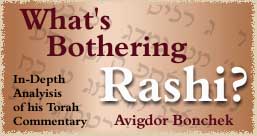

Back to this week's Parsha | Previous Issues
Parashas Ki'tezei
Last week (parashas Shoftim) we asked: Among the laws of Judges and judicial conduct is included the following: Deuteronomy 16: 19: "Do not pervert justice do not display favoritism and do not accept bribery, for bribery blinds the eyes of the wise and distorts the words of the righteous." RASHI Do not accept bribery: RASHI: Even to judge justly.
Rashi tells us that a judge may not take a bribe even to decide in favor of the just claimant.
Following is Rashi's reasoning is simple: Taking a bribe in order to pervert justice is obviously a transgression, this has already been forbidden in the first part of this verse - "do not pervert justice", so these words "do not take a bribe" must teach us another transgression. Rashi tells us that this is: "do not take a bribe" (payment from one claimant) even to render a judgment in favor of the just claimant. This too, the Torah tells us, is a transgression. Why? Perhaps we can say: Because taking a bride always has some subtle influence on a judge and even though justice may be done (after the bribe was taken) nevertheless maybe it was done in too harsh a manner against the claimant that didn't pay the extra bribe money. The Torah teaches us that not only the final decision must be just but the whole manner of the trial must be done in a just way. Now to this week's sedra:
Deuteronomy 21:11 "And you will see among the captives a woman of beautiful figure and you will desire her and you would take for a wife." RASHI "And you will take her for a wife": RASHI: The Torah speaks only in deference to the evil inclination (yetzer hara) "Lo dibra Torah elah keneged yetzer hara." For if the holy One, blessed be he, would not permit her, he would live with her illicitly. However, if he does marry her he will ultimately hate her, as it says afterwards (verse 15) "if a man has [two wives, one beloved and one hated etc.]" And ultimately he will father from her a wayward, rebellious, son; therefore these chapters adjoin one another. Rashi's comment is amazing! Rashi tells us that since a man in war would in any event take this beautiful gentile woman for his wife, therefore the Torah allowed it ! The wording in the Hebrew is: "Lo dibra Torah elah keneged yetzer hara." The Torah, Rashi says, is giving in to the evil inclination. Questioning Rashi:
A Question: How can this be so? When does the Torah ever "give in" to the yezer hara? If this were the Torah's approach then any time a man is tempted to do evil, we would expect the Torah to permit the sin on the basis of similar reasoning: "If the Torah does not permit it then he will nevertheless do the sin. So let us make this act permissible." We will suggest an answer IY"H next week.
Back to this week's Parsha | Previous Issues Permission is granted to redistribute electronically or on paper, provided that this notice is included intact.
For information on subscriptions, archives, and
http://www.shemayisrael.co.il |